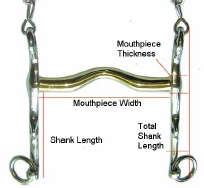How to Measure Your Bit
For thickness, length, cheek and ring diameter:

A very popular Weymouth in our range: 8016 15mm
The Measurement for the Weymouth cheek is taken below the mouthpiece - most are available in 5 cm, 7 cm or 9 cm (7 cm shown) - the Dressage Legal limit is 10cm.

In order to measure your horse's mouth and source a correctly fitting bit, a Neue Schule bit measure is available to download from our website.
The Diameter of the Mouthpiece
The diameter is measured at the widest part near the bit ring. As a general guide it is considered the wider the mouthpiece the milder the bit as this gives more weight bearing surface across the bars, etc. However, there is a happy medium; 18 mm is now generally the fattest mouthpiece we employ. In many instances once the balance and basics are established we would immediately source a thinner mouthpiece. Nowadays the thickness and design of the mouthpiece hinges more on mouth conformation, what level the horse is working at and what it is we are currently trying to achieve. For instance, we have many designs of mouthpiece available from 10mm to 18mm on a variety of cheeks.
The German Hollow mouth is an obvious example of people taking thicker is milder to the extreme. It was immensely popular several years ago. These bits were so incredibly fat that some horses could not even close their mouths properly. It stretched the skin so much in the corner of the lip that some horses' lips chafed and being hollow it was so light that when one gave with the rein it did not drop back down in the mouth quickly. This resulted in a very 'woolly' aid - I am not saying that some horses do not go well in this bit but the vast majority that I changed, for instance, into the 16mm or 18mm NS Tranz, Training or Demi Anky mouthpieces which were much more comfortable in the mouth and greatly improved in their way of going.
